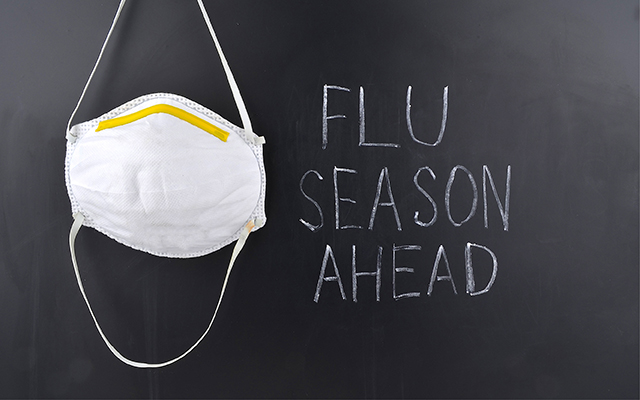An email from my clinic arrived the other day reminding me to schedule my annual flu shot. And RSV vaccine. And COVID booster. I haven’t acted on this advice for reasons that will become clear later, but the alert rekindled memories from prepandemic days when I greeted each influenza season with a shrug.
It wouldn’t be entirely accurate to call My Lovely Wife and me antivaxxers in the years before COVID, but we did harbor serious doubts about the necessity of all the recommended inoculations, which seemed to multiply exponentially every year. And because we were generally healthy throughout middle age (a result we reflexively credited to our reliance on acupuncturists and naturopaths), no serious health crisis forced us to reexamine our perspective. Supplements, not shots, ruled the day.
The pandemic — along with the random vicissitudes of aging — required that we reconsider our aversion to conventional medicine. Suddenly vulnerable to a deadly virus, we rolled up our sleeves for the COVID jab early in 2021 and did the same for the flu shot that fall. We’ve answered the call for the subsequent boosters, stayed current on our influenza immunizations, and I even welcomed a round of the shingles vaccine last year. (MLW keeps putting it off, but I don’t nag.) I can’t say that we’ve become vaccine evangelists at this point, but we do find ourselves lamenting the rising percentage of Americans who voice the same level of skepticism we once boasted.
Recent research, however, may change a few minds. Studies now suggest that routine vaccinations designed to prevent influenza and a host of other infectious diseases may also reduce the risk of developing dementia.
Studies now suggest that routine vaccinations designed to prevent influenza and a host of other infectious diseases may also reduce the risk of developing dementia.
In one 2022 study, neurology professor Paul Schulz, MD, and his team of researchers from the University of Texas Health Science Center at Houston, reviewed health data from nearly 2 million seniors — half of whom were vaccinated against the flu and half of whom were not. After accounting for various demographic and health conditions, they found that those who had received a flu shot for three consecutive years reduced their risk of developing dementia by 20 percent during a follow-up period ranging from four to eight years, compared with the non-vaccinated group. Those who had rolled up their sleeves for six consecutive flu vaccines were 40 percent less likely than their vaccine-averse counterparts to be diagnosed with cognitive dysfunction.
And earlier this year, Schulz and his team tested this hypothesis with three other common vaccines — shingles; tetanus, diphtheria, and pertussis (Tdap/Td); and pneumococcal pneumonia — and noted similar results. Analyzing data from more than 1.1 million seniors and adjusting for assorted variables, they found a strong correlation between those who received these vaccines and a reduced risk of dementia during a two- to eight-year follow-up period. The shingles inoculation lowered the risk by 72 percent compared with the unvaccinated group; Tdap/Td by 30 percent; and pneumococcal pneumonia by 27 percent.
“Vaccines are the great public health success story of our generation,” Schulz tells the Washington Post. “They keep you safe from any number of infections, many of which can be life-threatening. And now it appears there is another tremendous benefit, this one against a disease that is among the most feared.”
How these common vaccines may protect against dementia remains a bit of a mystery. One line of thinking posits that contracting the flu or any of these other infections could impair the body’s immune system over time, making the brain more vulnerable to an accumulation of amyloid plaque, a common marker of cognitive decline. By avoiding these illnesses, the brain stands less chance of cognitive injury.
One line of thinking posits that contracting the flu or any of these other infections could impair the body’s immune system over time, making the brain more vulnerable to an accumulation of amyloid plaque, a common marker of cognitive decline. By avoiding these illnesses, the brain stands less chance of cognitive injury.
“In some cases, [vaccines] may prevent viruses from causing direct neurological involvement, especially for neurotropic viruses, or indirectly through brain inflammation that can result from pathogens,” Peter Hotez, MD, PhD, codirector of the Texas Children’s Hospital Center for Vaccine Development, tells the Post. “In other cases, they may stimulate innate immune mechanisms that may be protective against the sequence of events leading to dementia.”
Schulz suggests that the vaccines may also have the opposite effect on the immune system, curbing its inclination to attack the invasive plaque and thus cooling the chronic inflammation that typically accompanies such cellular battles. Meanwhile, the neurons that would’ve been killed by a more aggressive immune response survive to support cognitive function.
“We aren’t sure yet exactly what the mechanism is,” he admits. “But something is going on with the brain and the immune system that seems to make a big difference.”
While Schulz and others continue to explore this nascent vaccine–dementia connection, MLW and I will wait patiently for a chance to schedule our next round of inoculations. Our late September bout with COVID persuaded us to delay our flu shots and COVID boosters for several weeks. It’ll give us a chance, I guess, to consider the RSV and pneumonia vaccines. And maybe I’ll start (gently) nagging MLW to finally get that shingles jab.





This Post Has 0 Comments